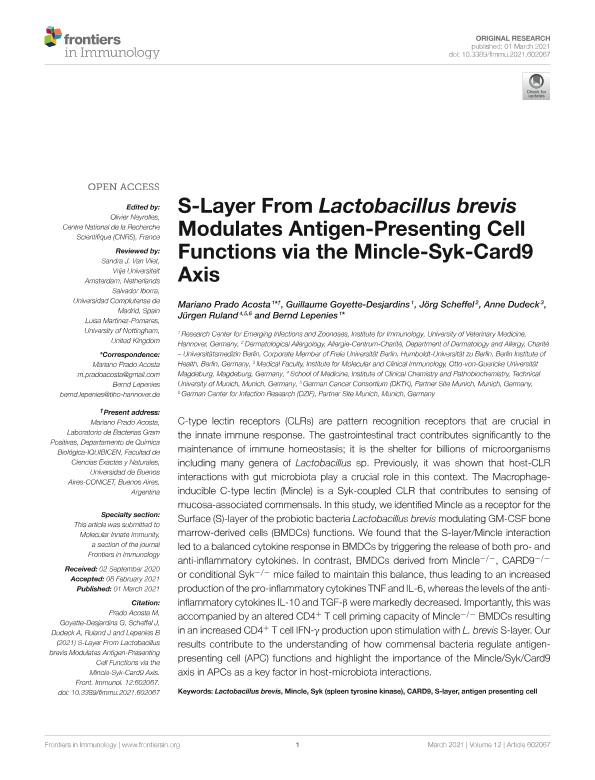Mostrar el registro sencillo del ítem
dc.contributor.author
Prado Acosta, Mariano

dc.contributor.author
Goyette Desjardins, Guillaume
dc.contributor.author
Scheffel, Jörg
dc.contributor.author
Dudeck, Anne
dc.contributor.author
Ruland, Jürgen
dc.contributor.author
Lepenies, Bernd
dc.date.available
2022-12-22T12:15:35Z
dc.date.issued
2021-03
dc.identifier.citation
Prado Acosta, Mariano; Goyette Desjardins, Guillaume; Scheffel, Jörg; Dudeck, Anne; Ruland, Jürgen; et al.; S-Layer From Lactobacillus brevis Modulates Antigen-Presenting Cell Functions via the Mincle-Syk-Card9 Axis; Frontiers Media; Frontiers in Immunology; 12; 3-2021; 1-13
dc.identifier.issn
1664-3224
dc.identifier.uri
http://hdl.handle.net/11336/182136
dc.description.abstract
C-type lectin receptors (CLRs) are pattern recognition receptors that are crucial in the innate immune response. The gastrointestinal tract contributes significantly to the maintenance of immune homeostasis; it is the shelter for billions of microorganisms including many genera of Lactobacillus sp. Previously, it was shown that host-CLR interactions with gut microbiota play a crucial role in this context. The Macrophage-inducible C-type lectin (Mincle) is a Syk-coupled CLR that contributes to sensing of mucosa-associated commensals. In this study, we identified Mincle as a receptor for the Surface (S)-layer of the probiotic bacteria Lactobacillus brevis modulating GM-CSF bone marrow-derived cells (BMDCs) functions. We found that the S-layer/Mincle interaction led to a balanced cytokine response in BMDCs by triggering the release of both pro- and anti-inflammatory cytokines. In contrast, BMDCs derived from Mincle−/−, CARD9−/− or conditional Syk−/− mice failed to maintain this balance, thus leading to an increased production of the pro-inflammatory cytokines TNF and IL-6, whereas the levels of the anti-inflammatory cytokines IL-10 and TGF-β were markedly decreased. Importantly, this was accompanied by an altered CD4+ T cell priming capacity of Mincle−/− BMDCs resulting in an increased CD4+ T cell IFN-γ production upon stimulation with L. brevis S-layer. Our results contribute to the understanding of how commensal bacteria regulate antigen-presenting cell (APC) functions and highlight the importance of the Mincle/Syk/Card9 axis in APCs as a key factor in host-microbiota interactions.
dc.format
application/pdf
dc.language.iso
eng
dc.publisher
Frontiers Media

dc.rights
info:eu-repo/semantics/openAccess
dc.rights.uri
https://creativecommons.org/licenses/by-nc-sa/2.5/ar/
dc.subject
ANTIGEN PRESENTING CELL
dc.subject
CARD9
dc.subject
LACTOBACILLUS BREVIS
dc.subject
MINCLE
dc.subject
S-LAYER
dc.subject
SYK (SPLEEN TYROSINE KINASE)
dc.subject.classification
Biología Celular, Microbiología

dc.subject.classification
Ciencias Biológicas

dc.subject.classification
CIENCIAS NATURALES Y EXACTAS

dc.title
S-Layer From Lactobacillus brevis Modulates Antigen-Presenting Cell Functions via the Mincle-Syk-Card9 Axis
dc.type
info:eu-repo/semantics/article
dc.type
info:ar-repo/semantics/artículo
dc.type
info:eu-repo/semantics/publishedVersion
dc.date.updated
2022-09-22T00:31:48Z
dc.journal.volume
12
dc.journal.pagination
1-13
dc.journal.pais
Suiza

dc.journal.ciudad
Lausanne
dc.description.fil
Fil: Prado Acosta, Mariano. Consejo Nacional de Investigaciones Científicas y Técnicas. Oficina de Coordinación Administrativa Ciudad Universitaria. Instituto de Química Biológica de la Facultad de Ciencias Exactas y Naturales. Universidad de Buenos Aires. Facultad de Ciencias Exactas y Naturales. Instituto de Química Biológica de la Facultad de Ciencias Exactas y Naturales; Argentina
dc.description.fil
Fil: Goyette Desjardins, Guillaume. University of Veterinary Medicine; Austria
dc.description.fil
Fil: Scheffel, Jörg. Humboldt-Universität zu Berlin; Alemania
dc.description.fil
Fil: Dudeck, Anne. Otto-von-Guericke-Universität Magdeburg; Alemania
dc.description.fil
Fil: Ruland, Jürgen. Universitat Technical Zu Munich; Alemania
dc.description.fil
Fil: Lepenies, Bernd. University of Veterinary Medicine; Austria
dc.journal.title
Frontiers in Immunology
dc.relation.alternativeid
info:eu-repo/semantics/altIdentifier/doi/http://dx.doi.org/10.3389/fimmu.2021.602067
Archivos asociados
